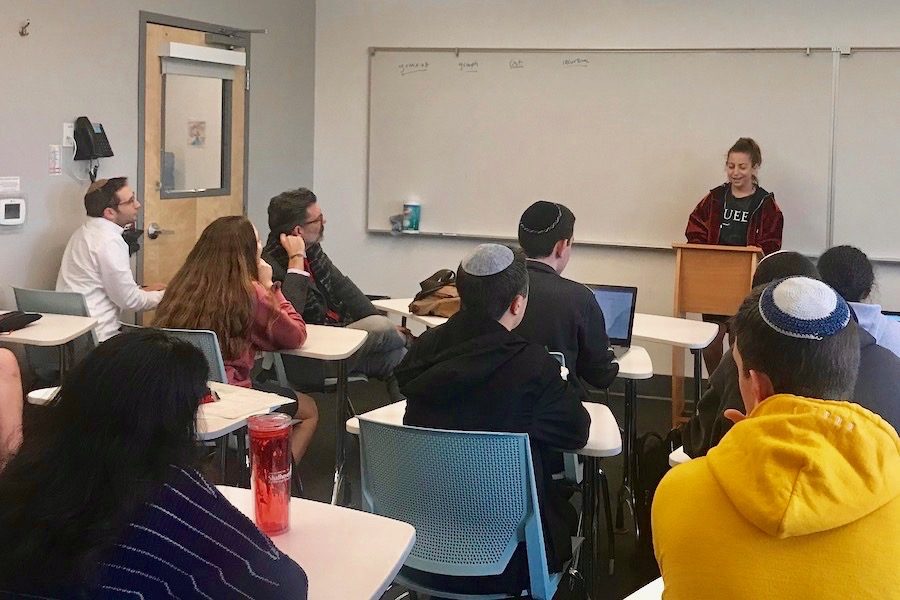Fairness leaders search for consistency as role expands
Town Hall now focuses on ‘discussion,’ officials say, and Fairness is asked for policy advice
TRIAL: On January 15, the Fairness Committee held their first open hearing of the year. Viewers were asked to leave for the committee’s deliberation. BP Photo by Gilad Spitzer
Last year, the Fairness Committee wrote and announced a new policy of consequences for students who skip davening. It involved increasingly severe consequences for being caught ditching davening, culminating in an out-of-school suspension for the third time caught.
In contrast, this year’s committee decided to make not a policy, but a ruling for just the specific case it was asked to consider.
“In the davening case, we were approached by the administration, who asked us to deal with the situation,” said senior Jonathan Fishman, this year’s Fairness co-chair. “There were a lot of kids who were ditching davening and the administration had an opinion about it. They wanted us to be fair about the student perspective. So that’s why we made the policy.”
Student reaction last year included complaints that the committee had made a decision affecting the whole community without hearing from the student body at all, he said. That affected how Fairness handled Donna Grunfeld’s case about behavior off-campus.
“Even though the administration asked us to create the policy, we still got a lot of backlash from the student body,” Jonathan said. “We came into this case thinking that we wouldn’t make a policy unless we were approached by the administration.”
After Donna’s case was resolved, the Fairness Committee met with Rabbi Segal Jan. 29 and came to a decision with him about how they would operate from now on.
“We gathered that the Fairness Committee should handle the grey areas in situations that happen in the school, rather than things that are clearly stated in the Handbook,” said Fairness Co-chair Jordana Glouberman. “That’s something we’ve learned for the future.”
Dean of Students and Agenda Committee adviser Rabbi Ari Schwarzberg considers Donna’s case, about when and whether dress code and kashrut rules apply off campus, just such a gray area. He wants the Fairness Committee to make a concrete and long-term decision, based on the merits of the case. So far, the committee has resisted (see related story, this page.)
“I would appeal to the committee to consider the larger values of the institution beyond what it said in the black-and-white Handbook,” said Rabbi Schwarzberg.
He said that since the Fairness Committee is judicial in nature — deciding disputes — it follows it should make policy that interprets rules.
“That’s the point of a judge, to me,” said Rabbi Schwarzberg. “Anyone knows exactly what the rule says. What happens when it’s something that happens in the grayer area? So in the end if you tell me to go to the Handbook that’s fine, but then what do we need a Fairness Committee for?”
But he also seemed to question whether students should be making school rules.
“The difficulty with students establishing rules is that most teenagers — and it’s appropriate — tend to want to make a decision or rule that is in their best interest without necessarily factoring in the needs or interests or values of others,” Rabbi Schwarzberg said. “And I’m sure when I was 15, 17 years old I would have done things similarly.”
Donna said that if administrators were to make a policy, it would be in their self-interest.
“I think that in both situations, it’s just not gonna be a fair vote,” said Donna. “If you bring it to Town Hall, most students are going to vote because it benefits them. And with the administration, they’re gonna do what they want.
“Even though they claim to have the students’ best interest at heart, I think they tend to value the school’s image, and I think they’re gonna do what’s best for that and not what’s best for the students.”
Dr. Jerry Friedman, who founded Shalhevet 25 years ago as a “democratic just community,” thinks students and teachers alike are capable of making decisions that do not directly benefit themselves — and of learning from mistakes when they go wrong.
“We believe that students will, in effect vote on rules that are good for the school, not just good for their own particular ego,” said Dr. Friedman in an interview, “… that they will be mature enough to say ‘This might be very good for me, but I don’t think it would be good for the school, therefore I’m gonna vote for what’s best for the school, not what’s best for my own ego.’”
Dr. Friedman said that rules should first go through Town Hall, which he said should be more than an opportunity for the administration to hear students’ thoughts.
“The whole thrust of Shalhevet was to say in effect that students, teachers and administration at a Town Hall meeting should get together and come up with thoughts and ideas, discuss it, vote on it and try it,” Dr. Friedman said. “If it doesn’t work, then you change it.
“Because the thrust was to develop an environment where the students should participate and develop their rules and regulations, and therefore feel that it’s their school and it’s not a benevolent, perhaps, dictatorship that most schools are.”
But Rabbi Schwarzberg believes the administration should end up making certain decisions.
“I think that administrators and faculty and adults should always be getting involved, to ensure that their experience and wisdom allows them to have input on whether something is the appropriate decision,” Rabbi Schwarzberg said.
“The idea of the Just Community and the common good is for all parties to be able to see the common good that is necessary and not just make a decision that is best for you,” he said. “That, though, is difficult.”
For now, the Fairness Committee — which is made up of officers and representatives elected by grade — will stay in the middle, interpreting how the Student Handbook and other sources of rules should be interpreted when questions come up. There have been no student-initiated changes so far this year.
Get the latest from The Boiling Point. Sign up for our news feed.

Jacob Joseph Lefkowitz Brooks was editor-in-chief during the 2019-20 school year and is now a student at the University of Toronto.









